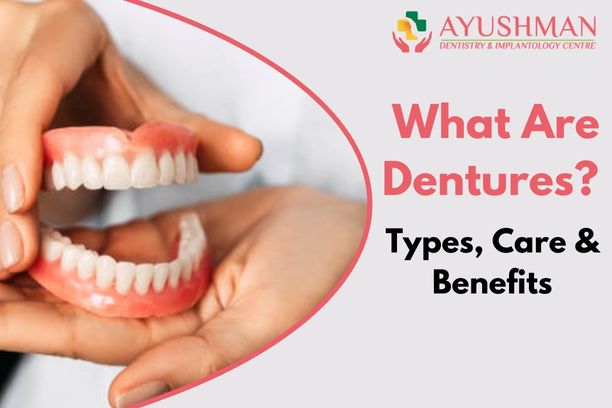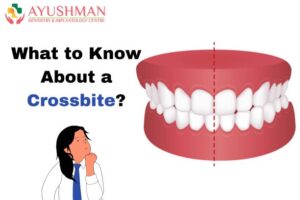What Are Dentures? Types, Care & Benefits

What Are Dentures? Types, Care & Benefits
What are Dentures?
Tooth loss can be a significant setback, impacting not only your appearance but also your ability to eat and speak comfortably. Dentures offer a reliable solution, restoring missing teeth with removable oral appliances. This guide delves into the world of dentures, exploring the different types, the process of getting them, and tips for optimal care and longevity.
Types of Dentures?
Dentures come in various configurations, each catering to specific needs. Here’s an overview of the most prevalent varieties:
- Full Dentures: These replace all teeth in an arch, either the upper or lower jaw. They rest on the gums and may require denture adhesive for a secure fit. Full dentures are the classic image that comes to mind for most people when they think of dentures.
- Partial Dentures: Ideal for individuals with some remaining natural teeth, partials fill in the gaps where teeth are missing. They have a gum-colored base with artificial teeth and clasps that hook onto existing teeth for stability.
- Immediate Dentures: Sometimes, tooth extractions are necessary before dentures can be placed. In such cases, immediate dentures offer a temporary solution. These are worn right after extractions and may need to be replaced with permanent dentures once healing is complete.
- Implant-Retained Dentures: These dentures take advantage of dental implants for enhanced stability. Implants are tiny, screw-like posts surgically placed in the jawbone to act as artificial tooth roots. Implant-retained dentures “snap on” to these implants, eliminating the need for denture adhesive and providing a more secure fit.
- Implant-Supported Dentures (Permanent Dentures or Hybrid Dentures): Unlike other removable dentures, implant-supported dentures are fixed and cannot be removed by the wearer. They require a dentist for removal and offer the closest experience to natural teeth. This option is ideal for those who prefer a non-removable solution.
Choosing the Right Denture: A Collaborative Effort
The best type of denture for you depends on several factors. Your dentist will conduct a thorough oral examination, including X-rays, to assess your jawbone health, the number of missing teeth, and the remaining teeth’ condition. Additionally, they will discuss your preferences for a removable or non-removable solution. Here are some key considerations:
- The extent of tooth loss: If all teeth in an arch are missing, full dentures are likely the best option. Partial dentures are appropriate for individuals retaining some of their natural teeth.
- Jawbone health: Dental implants require sufficient jawbone density for successful placement. If your jawbone has shrunk significantly due to tooth loss, bone grafting procedures might be necessary before implant-supported dentures become a viable option.
- Your preferences: Discuss your comfort level with removable dentures versus the permanence of implant-supported dentures.
The Denture Journey: From Consultation to Fitting
Getting dentures typically involves a series of appointments spread over several weeks:
- Consultation: This initial visit involves a comprehensive oral examination, including X-rays, to assess your suitability for dentures and determine the best type. Your dentist will discuss your expectations, answer any questions you may have, and explain the entire denture process.
- Taking Impressions: Your dentist will take precise molds of your jaw and remaining teeth (if any) using a special material. These impressions are crucial for creating a custom-made denture that fits your mouth perfectly.
- Creating the Denture: The impressions are sent to a dental laboratory, where a skilled technician crafts your denture using high-quality materials like acrylic resin, nylon, or metal. This process involves creating a wax model for tooth placement, building the denture base, and meticulously adding the artificial teeth.
- Denture Fitting and Adjustments: Once the denture is fabricated, your dentist will insert it in your mouth and assess the fit. They will make any necessary adjustments to ensure optimal comfort and functionality. This might involve fine-tuning the bite or trimming specific areas for a more secure fit. You may need multiple fitting appointments to achieve the perfect fit.
Living with Dentures: Adjustment and Care
Adapting to dentures takes time and patience. Initially, you might experience some soreness or difficulty speaking and eating. Practice speaking and chewing with your dentures in, and gradually introduce more challenging foods as your mouth adjusts. Here are some essential tips for optimal denture care and longevity:
- Daily Cleaning: Remove your dentures daily and clean them thoroughly with a soft-bristled denture brush and a mild, non-abrasive denture cleanser. Brushing your gums and tongue is also crucial to maintain good oral hygiene.
- Nightly Soaking: Soak your dentures overnight in a denture cleaning solution to remove plaque and debris. Steer clear of hot water, as it may cause the dentures to warp.
- Careful Handling: Dentures are delicate and prone to breakage. Always handle them with care over a sink or basin filled with water to minimize damage if you accidentally drop them.
- Regular Dental Checkups: Schedule regular dental appointments for professional cleanings and to monitor the fit of your dentures. Over time, your jawbone and gums may change, requiring adjustments or relining (adding new material to the base) to ensure a proper fit and prevent discomfort.
- Diet Considerations: While dentures allow you to enjoy a wider range of foods again, it’s wise to avoid very sticky or hard foods that can put undue stress on your dentures or damage them. Opt for softer foods cut into manageable pieces, especially during the initial adjustment period.
When to See Your Dentist
Dentures offer a wealth of benefits, but it’s important to be aware of some potential challenges:
- Initial Adjustment Period: As mentioned earlier, getting used to dentures takes time. Exercise patience and practice speaking and eating while wearing them.
- Loose-Fitting Dentures: Over time, dentures may become loose due to bone shrinkage. Regular dental checkups and relining procedures can address this issue.
- Speech Difficulties: Some people experience slight speech impediments when they first start wearing dentures. Practicing speaking exercises can help improve enunciation.
If you experience any of the following, schedule a dental appointment:
- Loose or ill-fitting dentures that cause discomfort or affect speech and eating
- Clicking sounds while speaking
- Damaged or discolored dentures
- Persistent gum irritation or sores
- Dentures that are more than 10 years old
The Benefits of Dentures
Dentures offer a multitude of advantages that go beyond restoring aesthetics:
- Improved Chewing Ability: Dentures allow you to chew food more effectively, leading to better digestion and nutrient absorption.
- Enhanced Speech: Properly fitted dentures can improve speech clarity and enunciation.
- Boosted Confidence: A complete and natural-looking smile can significantly boost your confidence and self-esteem when interacting with others.
- Better Nutrition: Improved chewing ability with dentures allows you to enjoy a wider variety of nutritious foods, promoting overall health.
In Conclusion
Dentures are a valuable tool for restoring oral function and aesthetics after tooth loss. With proper care and maintenance, they can last for many years. If you’re considering dentures, talk to your dentist to discuss the different options and determine if they are the right solution for you. By working collaboratively with your dentist, you can regain a confident smile, improve your ability to eat and speak and enjoy a higher quality of life.









